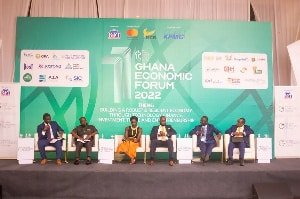According to experts at the 11th Ghana Economic Forum (GEF), the nation’s industrial woes can be solved if the correct mix between affordable, patient capital availability and the necessary skills training can be established.
Under Dr. Kwame Nkrumah, Ghana’s first president, the country began as a leader in industrialization on the continent, but over the past few decades, the economy’s structure has shifted toward import dependence, resulting in a massive balance of trade deficit, a rapidly appreciating currency, and worsening unemployment.
To correct this status quo, a team of diverse experts including Kwame Jantuah of Energy Consortium; Andy Akoto, Partner & Head of Advisory-KPMG; Anthony Morrison of the Agribusiness Chamber; Maame Awinador-Kanyirige, an International Trade Expert; and Linus Kumi, Head of Corporate Banking-GCB Bank PLC, all agreed that access to patient capital, a skilled workforce – particularly in technical areas, and firm and decisive leadership are needed.
They spoke on the topic Trade and Industrialisation Catalyst for Economic Growth and Development, during the third and final day of the 11th Ghana Economic Forum (GEF) organised in Accra by the Business and Financial Times (B&FT); and they collectively agreed that most efforts to industrialise the economy have failed because the right balance between access to patient credit and skills training in sectors where the country is looking to develop was not found.
“The human resource is one of the major natural resources we have. For example Singapore, what natural resources do they have? Nil. But are they not a developed country? Because they have invested in their people, today Singapore is doing a whole lot of things. Unfortunately, the youth who are following us have nothing to grab onto, have no direction because we don’t mentor the young ones,” Mr. Jantuah said.
He added that leadership can change the people’s mindset for good, and ensure that decisions are taken in the interest of the nation – which is also lacking.
Focusing on why industrialisation has eluded the country and why initiatives like the One District-One Factory (1D1F) have failed to make significant impact, Mr. Kumi cited lack of patient capital – noting that local lenders typically do not have the type of long-term credit needed to support the country’s industrialisation.
He however explained that pensions funds, usually long-term in nature, can provide a lasting solution – but only if the law can be amended for the funds to be used to finance long-term infrastructure and industrialisation projects.
The Pensions Law currently allows for 70 percent of total assets under management to be invested in government securities.
“Today, we are clear that finished petroleum products are what’s taking funding out of the economy. So, what do we do? We need to all put our hands together and fund a refinery and then be able to refine our diesel, petrol and the rest. So, I would risk putting my money into that sector, but we need to also have clear policies, regulatory forbearance to be able to support that,” Mr. Kumi added.
Concurring with Mr. Kumi, Mr. Akoto of KPMG said an industry like car manufacturing or assembling thrives on credit. “If you look at our environment, how many of us can afford cars without credit? So, it is not enough to put a statement on paper; it also requires linkages with other sectors which will ensure those policies make the maximum impact.
“We have to be very deliberate about how we put forth policies, but then move on to ensure that these are executed in tandem with the country’s long-term objectives,” he added.
If necessary, he said, the country should take the route of protectionism… but in an innovative manner in order to grow certain critical sectors of the economy without violating international trade protocols and procedures.
For the Agribusiness Chamber CEO, the only way to industrialise is by ensuring decisions are taken according to empirical evidence and market demands.
Explaining further, Mr. Morrison observed that most policies on industrialisation often lack detailed analysis of comparative advantage, best product variety and market taste – leading to their failure.
Meanwhile, Awinador-Kanyirige described the 1D1F initiative as a good programme but added that it should be reviewed if it is to make the desired impact. In its current form, she said, the policy is good for the long-term; but not every district needs a factory, and therefore it should be adjusted to be more practical. She added that funding also remains a big challenge, and local people who such factories are supposed to benefit could be left out.


